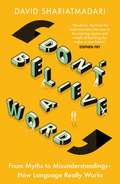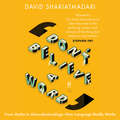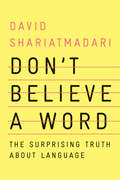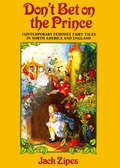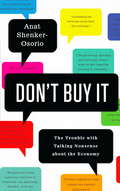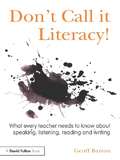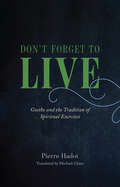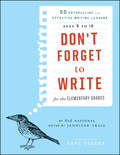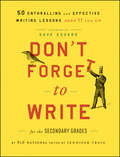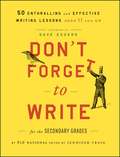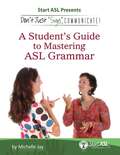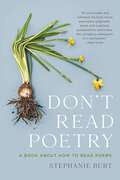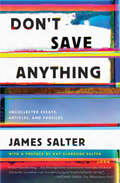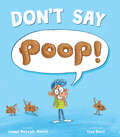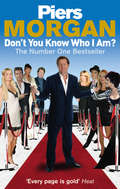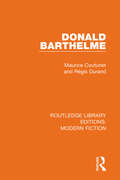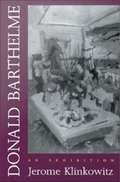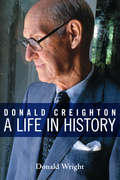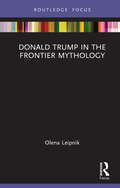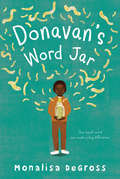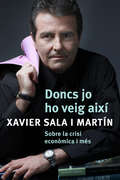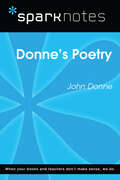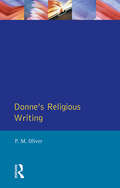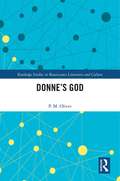- Table View
- List View
Don't Believe A Word: The Surprising Truth About Language
by David Shariatmadari***'Wonderful. You finish the book more alive than ever to the enduring mystery and miracle of that thing that makes us most human' STEPHEN FRY'Most popular books on language dumb down; Shariatmadari's smartens things up, and is all the more entertaining for it' THE SUNDAY TIMES, a Book of the Year'A meaty, rewarding and necessary read' GUARDIAN'Fascinating and thought-provoking . . . crammed with weird and wonderful facts . . . for anyone who delights in linguistics it's a richly rewarding read' MAIL ON SUNDAY ***- A word's origin doesn't tell you what it means today- There are languages that change when your mother-in-law is present- The language you speak could make you more prone to accidents- There's a special part of the brain that produces swear wordsTaking us on a mind-boggling journey through the science of language, linguist David Shariatmadari uncovers the truth about what we do with words, exploding nine widely-held myths about language while introducing us to some of the fundamental insights of modern linguistics.
Don't Believe A Word: The Surprising Truth About Language
by David Shariatmadari***'Wonderful. You finish the book more alive than ever to the enduring mystery and miracle of that thing that makes us most human' STEPHEN FRY'Most popular books on language dumb down; Shariatmadari's smartens things up, and is all the more entertaining for it' THE SUNDAY TIMES, a Book of the Year'A meaty, rewarding and necessary read' GUARDIAN'Fascinating and thought-provoking . . . crammed with weird and wonderful facts . . . for anyone who delights in linguistics it's a richly rewarding read' MAIL ON SUNDAY ***- A word's origin doesn't tell you what it means today- There are languages that change when your mother-in-law is present- The language you speak could make you more prone to accidents- There's a special part of the brain that produces swear wordsTaking us on a mind-boggling journey through the science of language, linguist David Shariatmadari uncovers the truth about what we do with words, exploding nine widely-held myths about language while introducing us to some of the fundamental insights of modern linguistics.
Don't Believe a Word: The Surprising Truth About Language
by David ShariatmadariA linguist’s entertaining and highly informed guide to what languages are and how they function. Think you know language? Think again. There are languages that change when your mother-in-law is present. The language you speak could make you more prone to accidents. Swear words are produced in a special part of your brain. Over the past few decades, we have reached new frontiers of linguistic knowledge. Linguists can now explain how and why language changes, describe its structures, and map its activity in the brain. But despite these advances, much of what people believe about language is based on folklore, instinct, or hearsay. We imagine a word’s origin is it’s “true” meaning, that foreign languages are full of “untranslatable” words, or that grammatical mistakes undermine English. In Don’t Believe A Word, linguist David Shariatmadari takes us on a mind-boggling journey through the science of language, urging us to abandon our prejudices in a bid to uncover the (far more interesting) truth about what we do with words. Exploding nine widely held myths about language while introducing us to some of the fundamental insights of modern linguistics, Shariatmadari is an energetic guide to the beauty and quirkiness of humanity’s greatest achievement.
Don't Bet on the Prince: Contemporary Feminist Fairy Tales in North America and England
by Jack ZipesFirst published in 1987. Routledge is an imprint of Taylor & Francis, an informa company.
Don't Buy It: The Trouble with Talking Nonsense about the Economy
by Anat Shenker-OsorioAfter everything that’s happened, how is it possible that conservatives still win debates about the economy? Time and again the right wins over voters by claiming that their solutions are only common sense, even as their tired policies of budgetary sacrifice and corporate plunder both create and prolong economic disaster. Why does the electorate keep buying what they’re selling? According to political communications expert Anat Shenker-Osorio, it’s all about language-and not just theirs, but ours. InDon’t Buy ItShenker-Osorio diagnoses our economic discourse as stricken with faulty messages, deceptive personification, and, worst of all, a barely coherent concept of what the economy actually is. Opening up the business section of most newspapers or flipping on cable news unleashes an onslaught of economic doomsaying that treats the economy as an ungovernable force of nature. Alternately, by calling the economy "unhealthy” or "recovering” as we so often do, we unconsciously give it the status of a living being. No wonder Americans become willing to submit to any indignity required to keep the economy happy. Tread lightly, we can’t risk irritating the economy! Cutting through conservative myth-making, messaging muddles, and destructive misinformation, Shenker-Osorio suggests a new way to win the most important arguments of our day. The left doesn’t have to self-destruct every time matters economic come to the fore-there are metaphors and frames that can win, and Shenker-Osorio shows what they are and how to use them. Don’t Buy Itis a vital handbook for seizing victory in the economic debate. In the end, it convincingly shows that radically altering our politics and policies for the better is a matter of first changing the conversation-literally.
Don't Call it Literacy!: What every teacher needs to know about speaking, listening, reading and writing
by Geoff Barton"Every teacher in English is a teacher of English," said George Sampson, one of the early school inspectors, back in 1921. It’s never been truer, or more relevant. Literacy has a major impact on young people’s life-chances and it is every teacher’s responsibility to help build their communication, reading and writing skills. However, this book isn’t just about literacy; it’s also about what great teachers do in their classrooms, about applying knowledge consistently across classrooms, in order to help pupils to become more confident in their subjects. This book shows every teacher – whatever your subject – the simple steps which could transform your students into better speakers, listeners, readers and writers. Harnessing a range of straightforward, but powerful techniques, it shows you how to help each student in your subject to improve their spelling, to use the key vocabulary of your subject more accurately and to speak, read and write with confidence like a historian, scientist, designer or mathematician. The book is structured into clear sections which are then divided into short, easy-to-absorb units on the classroom implications of what we know about literacy. Don’t Call it Literacy! also includes: language commentaries which exemplify points made by the author; talking points at the end of each unit for self-assessment; a glossary for non-specialists; subject specific vocabulary for building students’ word power; tutor time spellings lists; a reading list on teaching, language, literacy and education. Written by a leading authority in the field, this book will help both trainee and practising secondary school teachers to turn their classroom into literacy-friendly environments, increasing the motivation and achievement of their students.
Don't Forget the Oatmeal! A Supermarket Word Book, Featuring Jim Henson's Sesame Street Muppets
by B. G. FordJoin Bert, Ernie and Cookie Monster on a trip to the grocery store! How will Bert remember to buy the oatmeal he loves to eat every morning for breakfast? For January, the National Oatmeal Month.
Don't Forget to Live: Goethe and the Tradition of Spiritual Exercises (The France Chicago Collection)
by Pierre HadotThe esteemed French philosopher Pierre Hadot’s final work, now available in English. With a foreword by Arnold I. Davidson and Daniele Lorenzini. In his final book, renowned philosopher Pierre Hadot explores Goethe’s relationship with ancient spiritual exercises—transformative acts of intellect, imagination, or will. Goethe sought both an intense experience of the present moment as well as a kind of cosmic consciousness, both of which are rooted in ancient philosophical practices. These practices shaped Goethe’s audacious contrast to the traditional maxim memento mori (Don’t forget that you will die) with the aim of transforming our ordinary consciousness. Ultimately, Hadot reveals how Goethe cultivated a deep love for life that brings to the forefront a new maxim: Don’t forget to live.
Don't Forget to Write for the Elementary Grades
by 826 National StaffCreative strategies for getting young students excited about writing Don't Forget to Write for the Elementary Grades offers 50 creative writing lesson plans from the imaginative and highly acclaimed 826 National writing labs. Created as a resource to reach all students (even those most resistant to creative writing), the lessons range from goofy fun (like "The Other Toy Story: Make Your Toys Come to Life") to practical, from sports to science, music to mysteries. These lessons are written by experts, and favorite novelists, actors, and other celebrities pitched in too. Lessons are linked to the Common Core State Standards. A treasure trove of proven, field-tested lessons to teach writing skills Inventive and unique lessons will appeal to even the most difficult-to-reach students 826 National has locations in eight cities: San Francisco, New York, Los Angeles, Ann Arbor, Chicago, Seattle, Boston, and Washington DC 826 National is a nonprofit organization, founded by Dave Eggers, and committed to supporting teachers, publishing student work, and offering services for English language learners.
Don't Forget to Write for the Secondary Grades
by 826 National StaffFantastic strategies for getting high school students excited about writing This book offers 50 creative writing lesson plans from the imaginative and highly acclaimed 826 National writing labs. Created as a resource to reach all students (even those most resistant to creative writing), the off-beat and attention-grabbing lessons include such gems as "Literary Facebooks," where students create a mock Facebook profile based on their favorite literary character, as well as highly practical lessons like the "College Application Essay Boot Camp." These writing lessons are written by experts--and favorite novelists, actors, and other entertainers pitched in too. Road-tested lessons from a stellar national writing lab Inventive and unique lessons that will appeal to even the most difficult-to-reach students Includes a chart linking lessons to the Common Core State Standards 826 National is an organization committed to supporting teachers, publishing student work, and offering services for English language learners.
Don't Forget to Write for the Secondary Grades: 50 Enthralling and Effective Writing Lessons (Ages 11 and Up)
by Jennifer TraigFantastic strategies for getting high school students excited about writing. This book offers 50 creative writing lesson plans from the imaginative and highly acclaimed 826 National writing labs. Created as a resource to reach all students (even those most resistant to creative writing), the off-beat and attention-grabbing lessons include such gems as "Literary Facebooks," where students create a mock Facebook profile based on their favorite literary character, as well as highly practical lessons like the "College Application Essay Boot Camp. " These writing lessons are written by experts-and favorite novelists, actors, and other entertainers pitched in too. Road-tested lessons from a stellar national writing lab Inventive and unique lessons that will appeal to even the most difficult-to-reach students Includes a chart linking lessons to the Common Core State Standards 826 National is an organization committed to supporting teachers, publishing student work, and offering services for English language learners.
Don't Just Sign... Communicate!: A Student's Guide to Mastering ASL Grammar
by Michelle JayAre You Making Common Signing Errors? <p><p>Make no mistake about it... when venturing into the world of American Sign Language, the first thing you must understand is that ASL is its own language. It is different from English. ASL is also not like other Signing Systems. <p><p>Like any other Language, ASL contains its own unique rules of syntax, phonology, grammar, etc. To become fluent in the ASL language, you must first be armed with these essential rules and terminology. <p><p>Don't Just "Sign"... Communicate! methodically takes you, step-by-step, through the essentials of ASL Grammar to prepare you to truly and effectively communicate in and understand ASL. <p><p>This carefully outlined guide not only illustrates the importance of understanding ASL's overall differences in grammar, the topics are broken up into the six (6) major aspects of the language, making it that much easier for you to understand and follow! <p><p>Here's just a glimpse of what you'll find in this guide: <p>• Get the "inside scoop" about ASL -- Learn vocabulary concepts not taught in most ASL dictionaries and discover the most essential ASL grammar rules. <p>• Packed full with "must have" tools, a glossary of over 200 terms, and a grammar study sheet you'll use again and again! <p>• Everything you need in just one place... And answers to questions you may not even know to ask... <p><p>Regardless of your reasons for learning to communicate in ASL, once you have read this book with its expert advice and hints, you will truly be prepared to master the communication nuances of the ASL Language!
Don't Read Poetry: A Book About How to Read Poems
by Stephanie BurtAn award-winning poet offers a brilliant introduction to the joys--and challenges--of the genreIn Don't Read Poetry, award-winning poet and literary critic Stephanie Burt offers an accessible introduction to the seemingly daunting task of reading, understanding, and appreciating poetry. Burt dispels preconceptions about poetry and explains how poems speak to one another--and how they can speak to our lives. She shows readers how to find more poems once they have some poems they like, and how to connect the poetry of the past to the poetry of the present. Burt moves seamlessly from Shakespeare and other classics to the contemporary poetry circulated on Tumblr and Twitter. She challenges the assumptions that many of us make about "poetry," whether we think we like it or think we don't, in order to help us cherish--and distinguish among--individual poems.A masterful guide to a sometimes confounding genre, Don't Read Poetry will instruct and delight ingénues and cognoscenti alike.
Don't Save Anything: Uncollected Essays, Articles, and Profiles
by James Salter"In Don’t Save Anything . . . Kay Eldredge Salter assembles her late husband’s bread–and–butter journalism—yet how delicious good bread and butter can be! . . . As always, Salter emphasizes simple, vivifying details." —Michael Dirda, The Washington Post One of the greatest writers of American sentences in our literary history, James Salter’s acute and glimmering portrayals of characters are built with a restrained and poetic style. The author of several memorable works of fiction—including Dusk and Other Stories, which won the PEN/Faulkner Award—he is also celebrated for his memoir Burning the Days and many nonfiction essays. In her preface, Kay Eldredge Salter writes, “Don’t Save Anything is a volume of the best of Jim’s nonfiction—articles published but never collected in one place until now. Though those many boxes were overflowing with papers, in the end it’s not really a matter of quantity. These pieces reveal some of the breadth and depth of Jim’s endless interest in the world and the people in it . . . One of the great pleasures in writing nonfiction is the writer’s feeling of exploration, of learning about things he doesn’t know, of finding out by reading and observing and asking questions, and then writing it down. That’s what you’ll find here.” This collection gathers Salter’s thoughts on writing and profiles of important writers, observations of the changing American military life, evocations of Aspen winters, musings on mountain climbing and skiing, and tales of travels to Europe that first appeared in The New Yorker, Esquire, People, Condé Nast Traveler, the Aspen Times, among other publications.
Don't Say Poop!
by Jimmy Matejek-MorrisEveryone Poops meets The Book with No Pictures in this irresistibly naughty read-aloud. When you get the urge to say you-know-what, don't. DON'T SAY POOP!Why say a vile word like poop when you could say humdrum bum crumbs, float-or-sinker, major stinker, sometimes mushy from your tushy, or smelly belly funky jelly. See how much nicer that is? This silly book of tongue twisters will have kids doubled over as they learn some alternatives to their favorite potty words. Perfect for reading aloud, and for reading again and again!
Don't You Know Who I Am?: Insider Diaries of Fame, Power and Naked Ambition
by Piers Morgan'They say you can always remember where you where when pivotal moments happen, such as losing your virginity or Elvis dying. Let me add another to the list: the moment I sang a duet to the the "Macarena" with Timmy Mallett, live to millions of people...'Sacked from his high-profile job as a national newspaper editor, Piers Morgan dived helplessly into the world of celebrity. But even twenty years of commenting on the lives of the rich and famous couldn't prepare him for the extraordinary world he uncovered...A riveting, scandelous and brutally honest account of one man's quest for celebrity, Don't You Know Who I Am? lifts the lid on the egos and outrageous behaviour of everyone from Paris Hilton to Cherie Blair, Kate Moss to the legend that is the Hoff.
Donald Barthelme (Routledge Library Editions: Modern Fiction)
by Maurice Couturier Régis DurandIn the early 1980s Donald Barthelme was widely recognized in the United States as one of the major figures in contemporary postmodernism, a key and central experimental writer. In this study, originally published in 1982, two leading critics present Donald Barthelme’s work in its most radical and innovative aspects. Their essay combines textual analysis, critical theory and cultural awareness and aims at investigating the impact of Barthelme’s fictions on the reader and at defining the type of reading experience and pleasure such fictions can produce. Included in the aspects of Donald Barthelme’s work discussed here are his use of language, his sense of comedy, his parody, his vision of the modern self as fragmented and displaced, and his relation to psychoanalysis and other forms of art.
Donald Barthelme: An Exhibition
by Jerome KlinkowitzDonald Barthelme (1931-1989) is regarded as one of the most imitated and influential American fiction writers since the early 1960s. In Donald Barthelme: An Exhibition, Jerome Klinkowitz presents both an appreciation and a comprehensive examination of the life work of this pathbreaking contemporary writer. A blend of close reading, biography, and theory, this retrospective--informed by Klinkowitz's expert command of postmodern American fiction--contributes significantly to a new understanding of Barthelme's work. Klinkowitz argues that the central piece in the Barthelme canon, and the key to his artistic method, is his widely acknowledged masterpiece, The Dead Father. In turning to this pivotal work, as well as to Barthelme's short stories and other novels, Klinkowitz explores the way in which Barthelme reinvented the tools of narration, characterization, and thematics at a time when fictive techniques were largely believed to be exhausted. Klinkowitz, who was one of the first scholars to study Barthelme's work and became its definitive bibliographer, situates Barthelme's life and work within a broad spectrum of influences and affinities. A consideration of developments in painting and sculpture, for example, as well as those of contemporaneous fiction, contribute to Klinkowitz's analysis. This astute reading will provide great insight for readers, writers, and critics of contemporary American fiction seeking explanations and justifications of Barthelme's critical importance in the literature of our times.
Donald Creighton
by Donald WrightA member of the same intellectual generation as Harold Innis, Northrop Frye, and George Grant, Donald Creighton (1902-1979) was English Canada's first great historian. The author of eleven books, including The Commercial Empire of the St. Lawrence and a two-volume biography of John A. Macdonald, Creighton wrote history as if it "had happened," he said, "the day before yesterday." And as a public intellectual, he advised the prime minister of Canada, the premier of Ontario, and - at least on one occasion - the British government.Yet he was, as Donald Wright shows, also profoundly out of step with his times. As the nation was re-imagined along bilingual and later multicultural lines in the 1960s and 1970s, Creighton defended a British definition of Canada at the same time as he began to fear that he would be remembered only "as a pessimist, a bigot, and a violent Tory partisan."Through his virtuoso research into Creighton's own voluminous papers, Wright paints a sensitive portrait of a brilliant but difficult man. Ultimately, Donald Creighton captures the twentieth-century transformation of English Canada through the life and times of one of its leading intellectuals.
Donald Trump in the Frontier Mythology (Routledge Studies in Media, Communication, and Politics)
by Olena LeipnikThis book explores the presidential image of Donald Trump as it is constructed by the media within American national mythology, precisely the frontier myth. By offering an account of three milestones in the development of the frontier mythology in its intersection with presidential imagery, the book shows how the image of Donald Trump fits into the line of "cowboy presidents," together with Theodore Roosevelt and Ronald Reagan. It also offers insights into the reasons for making Russian president Vladimir Putin a part of Trump’s story and a routinely mentioned figure in American presidential politics. Applying the means of philosophical anthropology to this topical issue at the intersection of politics and the media, this volume will appeal to those working and studying in the areas of media studies, political anthropology, American studies, and myth studies.
Donavan's Word Jar (Trophy Chapter Bks)
by Cheryl Hanna Monalisa DeGrossThe classic story about the power of wordsDonavan Allen doesn’t collect coins, comics, or trading cards like most kids. He collects words—big words, little words, soft words, and silly words. Whenever Donavan finds a new word, he writes it on a slip of paper and puts it in his word jar.But one day, Donavan discovers that his word jar is full. He can’t put any new words in without taking some of the old words out—and he wants to keep all his words. Donavan doesn’t know what to do, until a visit to his grandma provides him with the perfect solution.
Doncs jo ho veig així: Sobre la crisi econòmica i més
by Xavier Sala i MartínUna antologia dels controvertits articles periodístics de l'economista espanyol més polèmic, contestatari i, al mateix temps admirat i seguit. Provocador per alguns, visionari per d'altres. L'única cosa que Xavier Sala i Martín no suscita és indiferència. Amb rigor i senzillesa, Xavier Sala i Martín explica, tant als experts com als neòfits, les bases de l'economia i del sistema econòmic mundial. L'actual crisi financera, definida per l'autor com una de les més importants dels últims cent anys, centra gran part dels seus darrers articles periodístics recollits en aquest llibre. També ens ofereix la seva opinió sobre temes com el canvi climàtic, la situació de l'Àfrica i altres aspectes de l'actualitat mundial, amb una nova visió de l'economia que deixa de banda propostes obsoletes i planteja els grans temes amb lucidesa i originalitat.
Donne's Poetry (SparkNotes Literature Guide Series)
by SparkNotesDonne's Poetry (SparkNotes Literature Guide) by John Donne Making the reading experience fun! Created by Harvard students for students everywhere, SparkNotes is a new breed of study guide: smarter, better, faster.Geared to what today's students need to know, SparkNotes provides:chapter-by-chapter analysis explanations of key themes, motifs, and symbols a review quiz and essay topics Lively and accessible, these guides are perfect for late-night studying and writing papers.
Donne's Religious Writing: A Discourse of Feigned Devotion (Longman Medieval and Renaissance Library)
by P. M. OliverThis, the first book to focus solely on Donne's religious writing, also places his work in a literary context and attempts to reach a more realistic assessment of its originality than has been possible hitherto. The prose works that are examined in detail include the controversial treatises Bianthanatos and Pseudo-Martyr, the satirical Ignatius His Conclave, the much-quoted Essays and Devotions and, of course, Donne's sermons.
Donne’s God (Routledge Studies in Renaissance Literature and Culture)
by P.M. OliverHis contemporaries recognised John Donne (1572-1631) as a completely new kind of poet. He was, wrote one enthusiast, ‘Copernicus in Poetrie’. But in the winter of 1614-15 Donne abandoned part-time versification for full-time priestly ministry, quickly becoming one of the most popular preachers of his time. While his verse has never been short of modern admirers, his sermons have recently begun to receive their full share of serious attention. Yet there exists almost no theologically-informed criticism to assist readers with navigating, let alone appreciating, the intricacies of Donne’s religious thinking. The need for such criticism is especially urgent since many readers approach his writing today with little previous knowledge of Christian doctrine or history. This book supplies that deficiency. Starting from the assumption that theology is inevitably the product of the human imagination, a perception that is traced back to major early Christian writers (and something that Donne implicitly acknowledged), it probes the complex amalgam that constituted his ever-shifting vision of the deity. It examines his theological choices and their impact on his preaching, analysing the latter with reference to its sometimes strained relationship with Christian orthodoxy and the implications of this for any attempt to determine how far Donne may legitimately be viewed as a mouthpiece for the Jacobean and Caroline Church of England. The book argues that the unconventionality that characterises his verse is also on display in his sermons. As a result it presents Donne as a far more creative and risk-taking religious thinker than has previously been recognised, especially by those determined to see him as a paragon of conventional Christian orthodoxy.
